How Home Team Services Address Mental Health in the Home Setting
Innovative Approaches to Mental Health Care at Home

Introduction: The Rise of Home-Based Mental Health Services
Home-based mental health services have become an essential component of community health efforts. With the growing need for accessible and effective mental health interventions in non-traditional settings, services delivered at home are gaining attention. This shift aims to offer support and treatment in familiar surroundings, enhancing patient comfort and recovery outcomes. This article explores the various models and programs transforming home-based mental health care, highlighting the methodologies, roles of family support, and specific services available to different populations.
Understanding Home-Based Mental Health Care
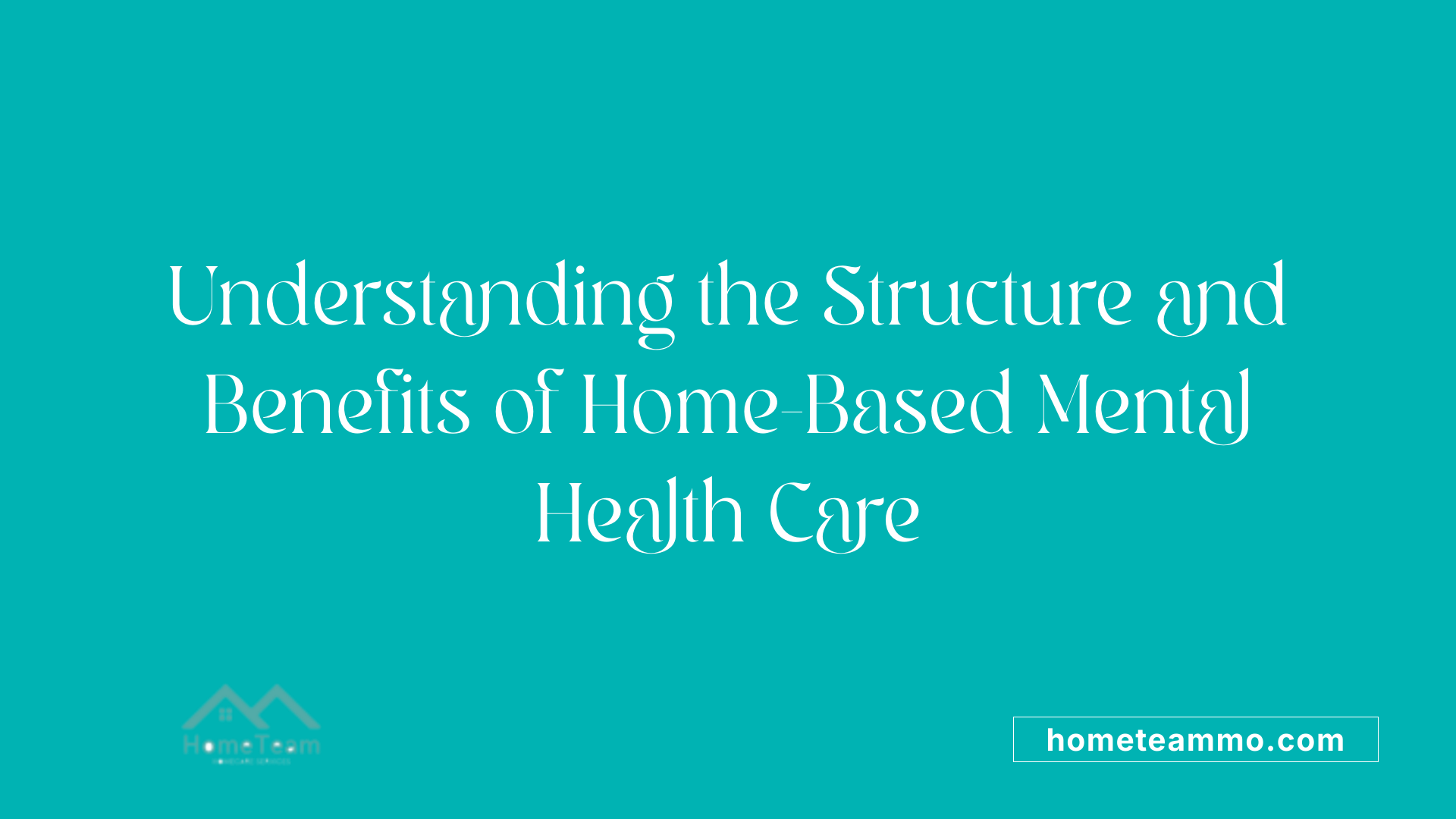
How does home-based mental health care work?
Home-based mental health care delivers essential services directly in the patient’s home by a dedicated team of mental health professionals. This model is particularly advantageous for individuals aged 16 and above grappling with moderate to severe mental health issues. It serves as a viable alternative to inpatient hospitalization, ensuring that patients receive appropriate support in a familiar environment.
The structure of home-based mental health care includes models like the Home Outreach & Mobile Engagement (HOME) program, which focuses on individuals with severe and persistent mental illnesses, especially those experiencing homelessness. Services offered within this framework may comprise clinical assessments, street psychiatry, medication management, and connection to additional supportive services.
Home Treatment Teams, such as those found in East Lancashire, play a crucial role by facilitating earlier hospital discharges and providing continuous support within the community. They operate around the clock, offering urgent crisis support to individuals in need. Patients can generally access these services in two ways: directly or through referrals from family members, general practitioners, or social care professionals. For immediate queries, individuals can reach out to dedicated helplines like 0800 0130 707, ensuring they can quickly find the help they require.
Access to care pathways
The coordinated approach in home-based mental health care emphasizes the importance of clear referral pathways. Programs like the Assertive Community Treatment Team (ACTT) and Crisis Evaluation and Observation services exemplify this strategy. By streamlining communications among different care providers and ensuring widespread outreach, these models effectively meet the necessary mental health requirements of individuals across various circumstances.
In summary, home-based mental health care works as a comprehensive service model that integrates direct client care with community resources, making mental health support more accessible for those in vulnerable situations.
Role of Family and Caregivers in Home-Based Treatment
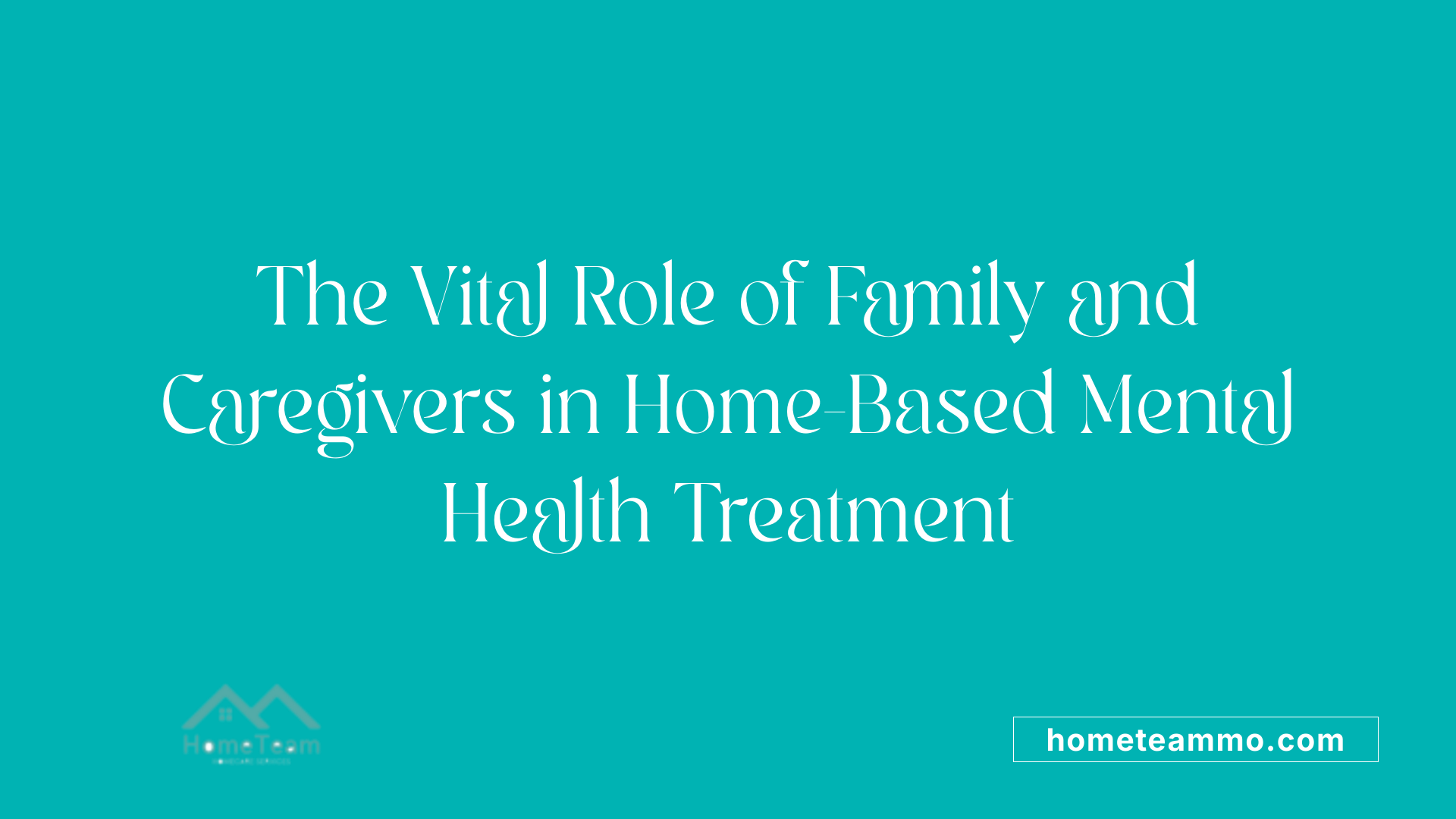
What are the roles of family and caregivers in home-based mental health care?
Family and caregivers play a crucial role in the realm of home-based mental health care. They are often responsible for managing the daily needs of individuals with mental health conditions, which includes providing emotional and logistical support. This involvement is paramount in creating a stable and supportive environment conducive to recovery.
Their responsibilities extend to assisting in treatment adherence, recognizing symptoms, and facilitating communication with healthcare providers. Caregivers also provide companionship, which can alleviate feelings of isolation that often accompany mental illness.
Coping with Stress and Burnout
However, the role of caregivers is not without its challenges. Many report experiencing objective and subjective caregiver burdens, leading to feelings of sadness, hopelessness, and stress. These emotional strains can distort their ability to provide effective support, as caregivers may feel overwhelmed without adequate resources.
Coping strategies are essential for caregivers; those who engage in effective stress-management practices are more likely to maintain their mental health and provide better care. Importantly, having higher emotional support networks can significantly improve caregivers' outcomes.
The Impact of Family Support on Recovery
Family support also directly impacts the outcomes of mental health treatment. Increased participation of family members in care has been shown to facilitate reduced symptom severity and promote quicker recovery times. Moreover, when caregivers are actively involved in the treatment process, patients experience fewer relapses and adhere better to treatment plans.
Thus, fostering open communication and establishing a supportive atmosphere becomes essential for successful home-based therapy, providing the stabilizing force that enhances recovery for individuals with mental health conditions.
Effectiveness of Home-Based Programs for Veterans and Other Groups
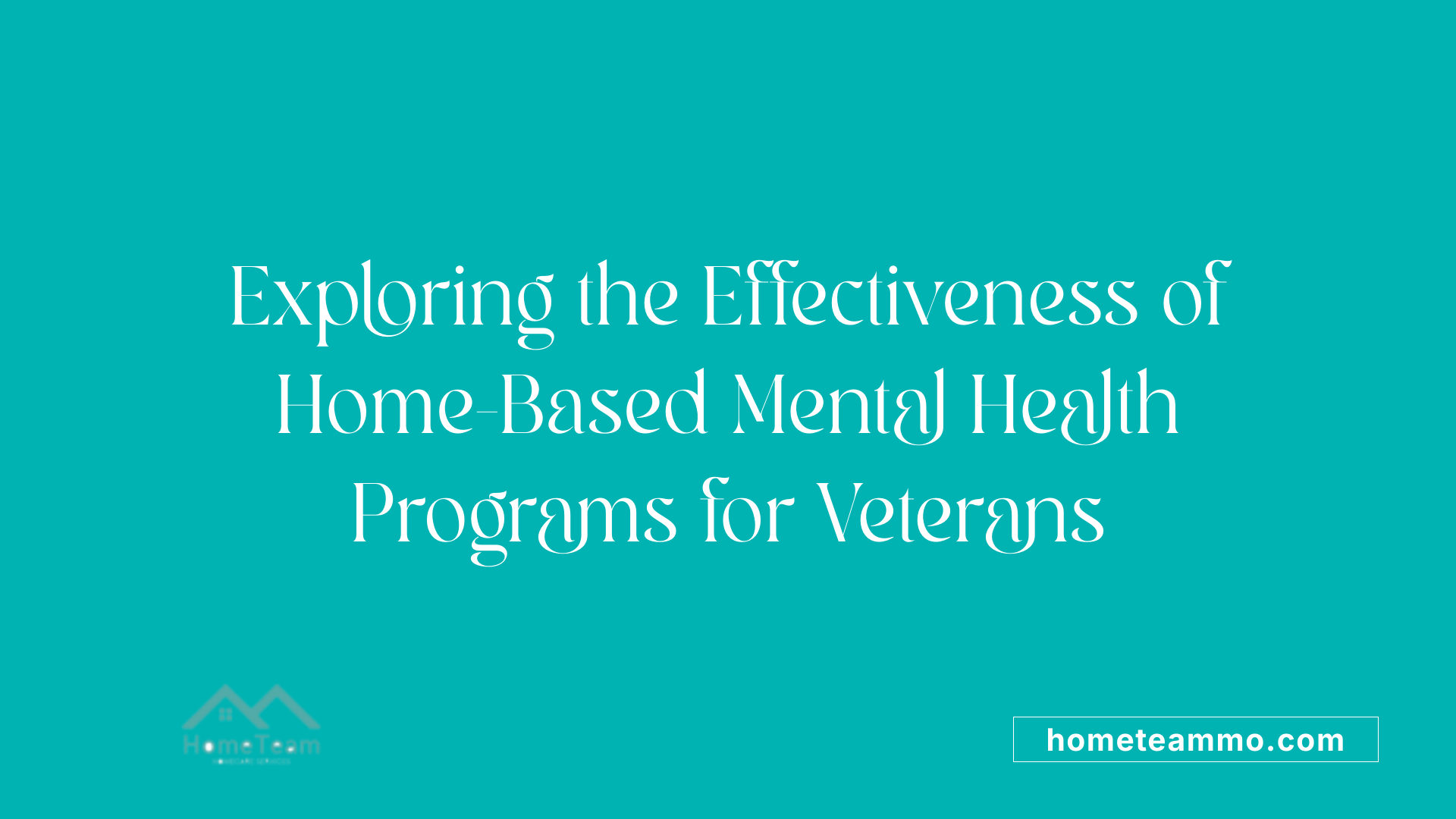
What is the effectiveness of home-based mental health programs for specific groups, such as veterans?
Home-based mental health programs have gained recognition for their effectiveness, particularly among veterans who experience challenges such as PTSD and depression. These programs, especially those integrating telehealth and blended approaches, have yielded promising results. For instance, interventions like webSTAIR have demonstrated significant reductions in symptom severity and have encouraged veterans to engage more actively in outpatient mental health care.
Programs like the HOME program have shown that veterans are more likely to partake in mental health treatments after discharge compared to those receiving standard care. The convenience of receiving care at home eliminates barriers related to stigma and accessibility, which can often hinder veterans from seeking help.
How has telehealth enhanced the outcomes for veterans?
Telehealth services have been instrumental in strengthening social connections among veterans. They provide a platform for consistent engagement with mental health professionals without the constraints of traditional in-person visits. This aspect is particularly beneficial for veterans residing in rural or underserved communities who may otherwise lack access to suitable mental health resources.
In summary, there is robust evidence supporting the efficacy of home-based mental health interventions for veterans. These programs not only address psychological needs but also empower veterans to take a more active role in their recovery journeys.
Integrated Health Home Model: A Comprehensive Approach
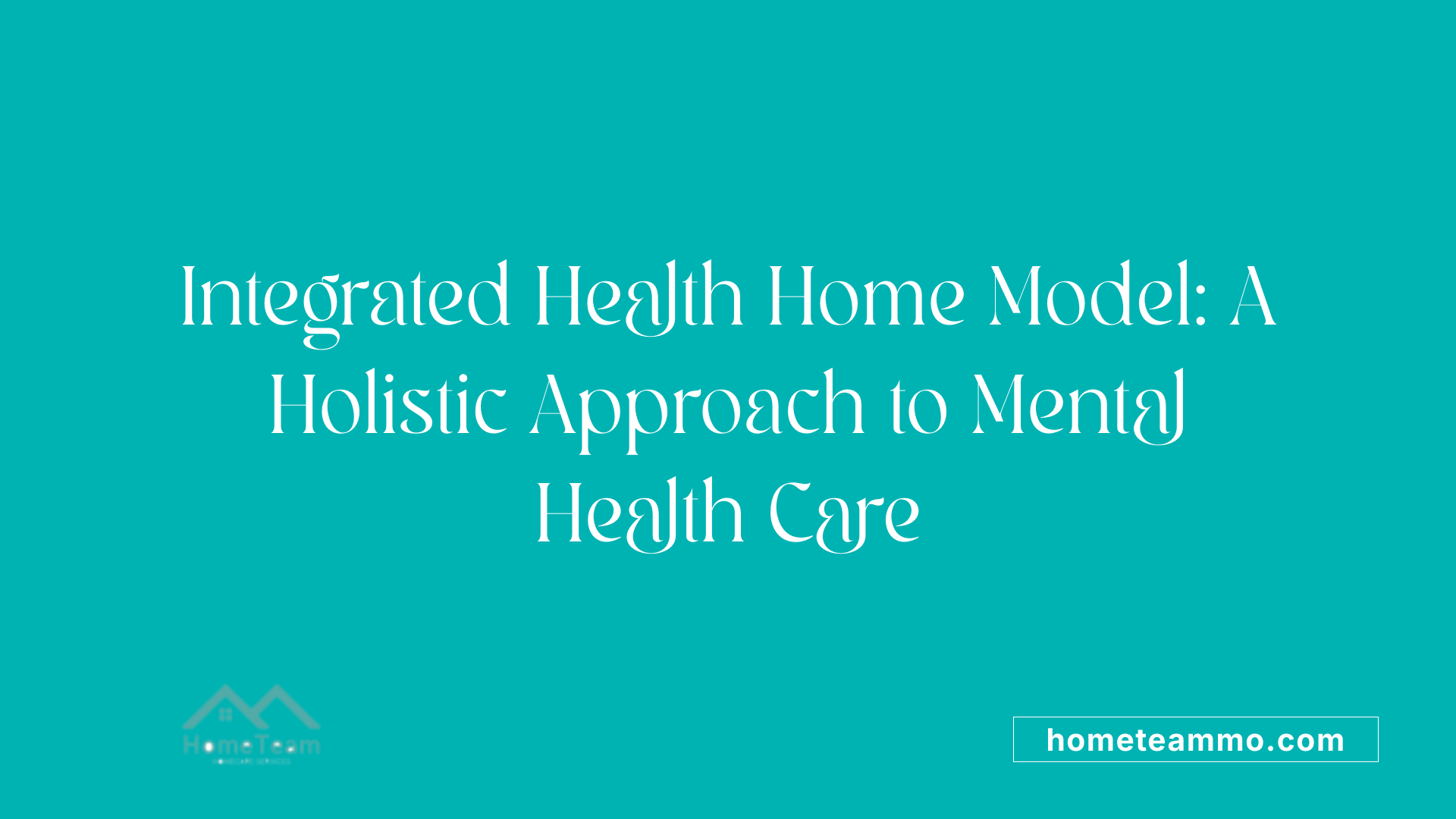
What is the Integrated Health Home model for mental health care?
The Integrated Health Home (IHH) model for mental health care is a comprehensive approach that aims to support individuals with serious mental illness and children with serious emotional disturbances. This model provides a holistic and patient-centered framework that integrates mental and physical health care, along with necessary social services.
Coordination of care
At the heart of the IHH model is coordination of care. A primary case manager is assigned to each client to develop and continuously update a treatment plan tailored to the client's evolving needs. This ensures that individuals receive consistent support while navigating the complexities of the healthcare system.
Role of multidisciplinary teams
The IHH utilizes multidisciplinary teams comprising various healthcare professionals including psychiatrists, nurses, social workers, and peer support specialists. These teams collaborate to implement a coordinated care plan that not only addresses mental health treatment but also encompasses physical health and social well-being, recognizing the interconnectedness between these areas.
Integration of services
Integrating services is a critical feature of the IHH model. Patients benefit from a seamless flow of information and resources among providers, which enhances accessibility to various health services and community resources. This comprehensive approach fosters better health outcomes by addressing factors such as food insecurity, housing instability, and overall wellness goals. Ultimately, the IHH model champions a supportive environment that improves the quality of care for individuals navigating their mental health journey.
Guidelines for Behavioral Health Crisis Care at Home
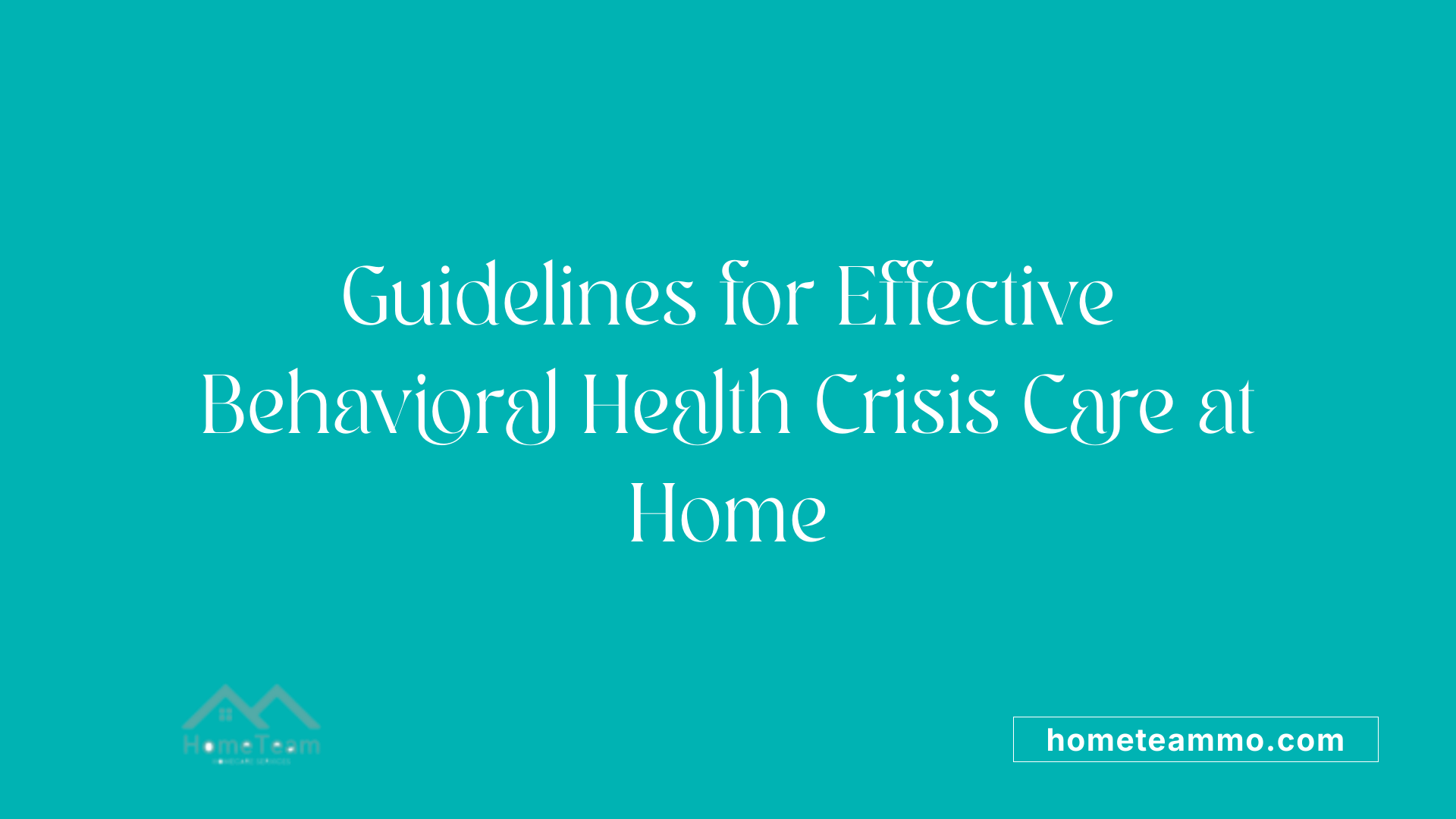
What frameworks and guidelines are used in behavioral health crisis care within a home setting?
The frameworks and guidelines employed in behavioral health crisis care at home are predominantly presented in the National Behavioral Health Crisis Care Guidance issued by the Substance Abuse and Mental Health Services Administration (SAMHSA). One key aspect of this guidance is the 2025 National Guidelines for a Behavioral Health Coordinated System of Crisis Care. This serves as a strategic blueprint aimed at enhancing community responses to behavioral health crises.
Key elements comprise:
- 988 Lifeline: This offers immediate support for individuals in crisis, facilitating timely intervention.
- Mobile Crisis Teams: These teams provide on-site evaluations and support, making it possible to address issues in a familiar environment.
- Safe Stabilization Locations: Regions designated for individuals in crisis to receive care and support until stabilization is achieved.
Additionally, a draft implementation toolkit specifically for Mobile Crisis Team services has been developed, emphasizing best practices to streamline service delivery. Overall, these guidelines are designed to transform crisis care systems within communities, addressing grave concerns like rising suicide rates and addiction overdoses.
These structured approaches highlight the commitment to ensuring supportive interventions are accessible in home environments, paving the way for more manageable and effective care.
Conclusion: Paving the Way for Home-Based Mental Health Care
Home-based mental health services represent a dynamic shift in the delivery of mental health care, focusing on personalized, community-based interventions that foster long-term recovery and stability. These programs not only enhance accessibility and comfort for patients but also leverage the strengths of family involvement and integrated care models. As these home-focused interventions continue to evolve, they promise to play a critical role in improving mental health outcomes across diverse populations.
References
- Service Area 7 Home Team - LA County Department of Mental Health
- Hospital-in-the-Home as a Model for Mental Health Care Delivery
- The role of family and friends in at-home mental health treatment
- [PDF] HOME Team - Lacounty
- Common adult and youth services to treat mental illness - Partners
- HomeTeam - Mental Health Training for Veterans
- Pathway Home™ – CBC - Coordinated Behavioral Care
- Decision-making in crisis resolution and home treatment teams
.jpg)
Understanding Mental Health Support at Home
.jpg)
How Often Should You do Physical Therapy at Home?

3 Tips in Yard Work Help for Seniors
.jpg)
Understanding Sleep Disorders in Seniors
.jpg)
In-Depth Guide on Managing Chronic Conditions at Home
.jpg)
